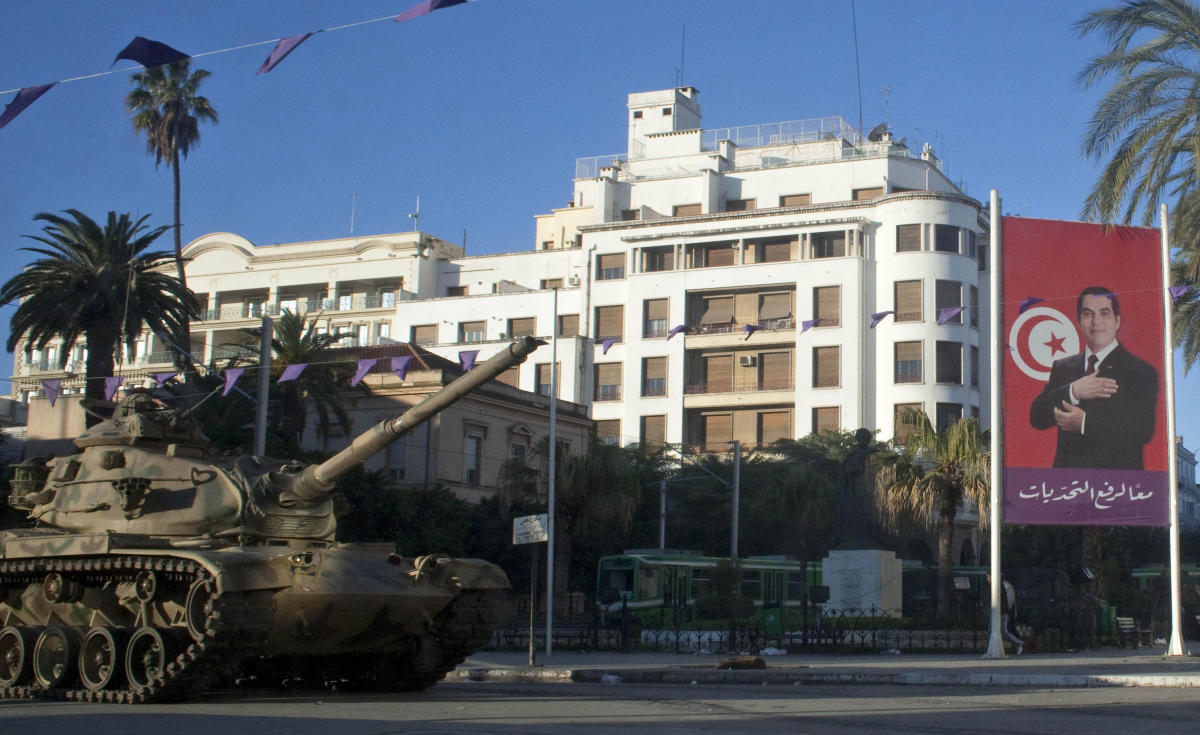
NICE, France (AP) — Tunisia’s increasingly authoritarian president appears determined to upend the country’s political system. The strategy is not only threatening a democracy once seen as a model for the Arab world, experts say it is also sending the economy toward a tailspin.
The International Monetary Fund has frozen an agreement meant to help the government get loans to pay public sector salaries and fill budget gaps aggravated by the COVID-19 pandemic and the fallout from Russia’s war in Ukraine.
Foreign investors are pulling out of Tunisia, and ratings agencies are on alert. Inflation and joblessness are on the rise, and many Tunisians, once proud of their country’s relative prosperity, now struggle to make ends meet.
An election debacle a week ago has made matters worse: Just 11% of voters took part in a first-round vote for a new parliament meant to replace a legislature disbanded last year by President Kais Saied. Opposition figures, including from the popular Islamist movement Ennahdha, are demanding that he step down, and unions are threatening a general strike.
Saied himself designed the elections to replace and reshape the parliament, as part of broad reforms that bolster his powers and that he says will solve Tunisia’s multiple crises. But voter disillusionment with the ruling class amid dire economic troubles contributed to a near-boycott of the election.
Tunisia’s Western allies, like the United States and France, have expressed concern and urged the president to forge an inclusive political dialogue that would benefit the sluggish economy. Tunisia was the birthplace of Arab Spring democratic uprisings 12 years ago.
Saied rejected criticism over the low voter turnout, saying what really matters is the second round of voting Jan. 19. He says his reforms are needed to rid the country of the corrupt political class and Tunisia’s foreign enemies. He lashed out at his political foes in the Ennahdha party, which had the largest number of lawmakers in the previous parliament, and ordered the arrest this week of its vice-president and former Prime Minister Ali Larayedeh on terrorism-related charges.
“Saied seems impervious to criticism and intent on bulldozing his way to a new political system no matter how few Tunisians are engaged in the process,” said Monica Marks, a Tunisia expert and professor of Middle East politics at the New York University in Abu Dhabi.
“No Tunisian asked Saied to reinvent the wheel of Tunisian politics, to write a new constitution and revamp the election law,” Marks said. “What Tunisians have been asking for is a more respectful government that meets their bread-and-butter needs and gives them economic dignity.”
Saied’s promises to stabilize the economy helped ensure his landslide victory in the 2019 presidential election.
But he has yet to present an economic recovery plan or strategy for his deeply indebted government to secure funds to pay for food and energy subsidies. The president has sidelined economists in state institutions, stalling the country’s budget and souring the environment for foreign investors.
Tunisians have been hit with soaring food prices and shortages of fuel and basic staples like sugar, vegetable oil and rice in recent months. Inflation has reached 9.1%, the highest in three decades, according to the National Institute of Statistics, and unemployment is at 18% percent, according to the World Bank.
“President Saied naively seems to think that if only he can complete his political roadmap, the economy will fix itself,” said Geoff Porter, a New York City-based North Africa risk assessment analyst, in a recent brief.
Tunisia reached a preliminary agreement with the IMF on a $1.9 billion loan in October. It would enable the heavily indebted Tunisian government to access loans from other donors over a four-year period in return for sweeping economic reforms that include shrinking the public administration sector — one of the world’s largest — and a gradual lifting of subsidies.
The agreement was subject to the IMF executive board’s approval, scheduled for Dec. 19. The state news agency TAP reported that “the government and the IMF have agreed to postpone” the final decision on the loan to give Tunisian officials “more time to present a new reform plan for the country’s sluggish economy.”
Tunisia desperately needs access to the special drawing rights in order to avoid defaulting on external debt and to stabilize the economy, Porter said. He added: “Without the IMF funds, Tunisia’s economic freefall will accelerate.”
Foreign investors operating in Tunisia are worried.
Pharmaceutical manufacturers Novartis, Bayer and GlaxoSmithKline are leaving the country because they are not getting paid by the insufficiently funded state pharmaceutical distributor.
Royal Dutch Shell, which operates two gas fields that accounted for 40% of Tunisia’s domestic production, announced in November it will exit Tunisia by year’s end. Despite hype over the country’s hydrogen sector, nothing has been done to attract investors as the country’s regulatory institutions are paralyzed by Saied’s political moves, Porter said.
The president has also lost the tentative support of the country’s powerful trade union, the UGTT, for the IMF-prescribed reform plan in exchange for a bailout.
UGTT leader Noureddine Taboubi agreed with the government in August to discuss a new “social contract” to help Tunisians in financial distress, the state TAP news agency reported. But Taboubi, whose influential union represents 67% of Tunisia’s work force, mainly employed in the public sector, recently pulled back on his commitment. He renewed his opposition to the IMF’s main demands to receive a loan program: a public sector wage freeze and restructuring of state-owned enterprises.
___
Bouazza ben Bouazza contributed from Tunis, Tunisia.




